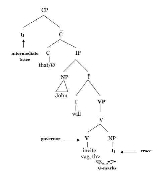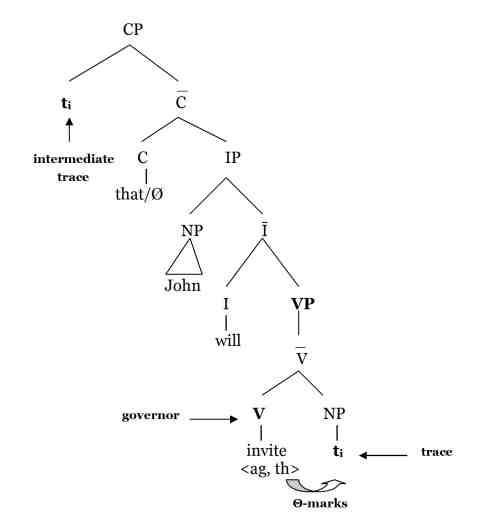
Empty category principle
Encyclopedia
In linguistics
, the empty category principle (ECP) was proposed in Noam Chomsky
's syntactic framework of government and binding theory
. The ECP is supposed to be a universal syntactic constraint that requires trace
s to be properly governed.
Proper government is defined as follows:
The ECP is a way of accounting for, among other things, the empirical fact that it is generally more difficult to move up a wh-word from a subject position than from an object position.
The intermediate trace
s must be deleted because they cannot be properly governed; theta-government is impossible because of the position they occupy, Spec-CP; the only possible antecedent-governor might be an overt NP (a wh-word), but the Minimality Condition would always be violated because of the tensed I (which must be present in all matrix clauses), the tensed I would c-command
the intermediate trace but it would not c-command the wh-word. So we have to say that intermediate traces must be deleted at LF
so that they can avoid the ECP.
In the case of object extraction (the trace is a complement of VP), theta-government is the only possible option. In the case of subject extraction (the trace in Spec-IP), antecedent-government is the only possible option.
If the trace is in Spec-IP and we have an overt complementizer
(such as that), the sentence is ungrammatical because the ECP is violated. The closest potential governor would be the complementizer, which cannot antecedent-govern the trace because it is not coindexed with it (and theta-government is impossible since trace is in Spec-IP).
For example, in the sentence Who do you think (that) John will invite? the ECP works in the following way (the structure is given for the embedded clause only):

Linguistics
Linguistics is the scientific study of human language. Linguistics can be broadly broken into three categories or subfields of study: language form, language meaning, and language in context....
, the empty category principle (ECP) was proposed in Noam Chomsky
Noam Chomsky
Avram Noam Chomsky is an American linguist, philosopher, cognitive scientist, and activist. He is an Institute Professor and Professor in the Department of Linguistics & Philosophy at MIT, where he has worked for over 50 years. Chomsky has been described as the "father of modern linguistics" and...
's syntactic framework of government and binding theory
Government and binding theory
Government and binding is a theory of syntax and a phrase structure grammar in the tradition of transformational grammar developed principally by Noam Chomsky in the 1980s...
. The ECP is supposed to be a universal syntactic constraint that requires trace
Trace (linguistics)
In transformational grammar, a trace is an empty category that occupies a position in the syntactic structure. In some theories of syntax, traces are used in the account of constructions such as wh-movement and passive....
s to be properly governed.
Proper government is defined as follows:
- A properly governs B iffIf and only ifIn logic and related fields such as mathematics and philosophy, if and only if is a biconditional logical connective between statements....
A theta-governs B or A antecedent-governs B.- A theta-governs B iff A governs B and A theta-marks B.
- A antecedent-governs B iff A governs B and is coindexed with B.
The ECP is a way of accounting for, among other things, the empirical fact that it is generally more difficult to move up a wh-word from a subject position than from an object position.
The intermediate trace
Trace (linguistics)
In transformational grammar, a trace is an empty category that occupies a position in the syntactic structure. In some theories of syntax, traces are used in the account of constructions such as wh-movement and passive....
s must be deleted because they cannot be properly governed; theta-government is impossible because of the position they occupy, Spec-CP; the only possible antecedent-governor might be an overt NP (a wh-word), but the Minimality Condition would always be violated because of the tensed I (which must be present in all matrix clauses), the tensed I would c-command
C-command
In syntax, c-command is a relationship between nodes in parse trees. Originally defined by Tanya Reinhart ,it corresponds to the idea of "siblings and all their descendants" in family trees.-Definition and Example:...
the intermediate trace but it would not c-command the wh-word. So we have to say that intermediate traces must be deleted at LF
Logical form
In logic, the logical form of a sentence or set of sentences is the form obtained by abstracting from the subject matter of its content terms or by regarding the content terms as mere placeholders or blanks on a form...
so that they can avoid the ECP.
In the case of object extraction (the trace is a complement of VP), theta-government is the only possible option. In the case of subject extraction (the trace in Spec-IP), antecedent-government is the only possible option.
If the trace is in Spec-IP and we have an overt complementizer
Complementizer
In linguistics , a complementizer is a syntactic category roughly equivalent to the term subordinating conjunction in traditional grammar. For example, the word that is generally called a complementizer in English sentences like Mary believes that it is raining...
(such as that), the sentence is ungrammatical because the ECP is violated. The closest potential governor would be the complementizer, which cannot antecedent-govern the trace because it is not coindexed with it (and theta-government is impossible since trace is in Spec-IP).
For example, in the sentence Who do you think (that) John will invite? the ECP works in the following way (the structure is given for the embedded clause only):


